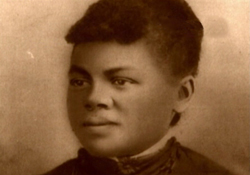Teachers' Domain - Digital Media for the Classroom and Professional Development
User: Preview

Source: The Rise and Fall of Jim Crow: “Promises Betrayed”
Lucy Craft Laney was born during the time of slavery in Macon, Georgia. Her father was a Presbyterian minister and a skilled carpenter who had bought his and his wife's freedom. Laney attended Lewis High School, founded by the Freedmen's Bureau after the Civil War, and subsequently enrolled in the newly founded Atlanta University, where she was a member of the first graduating class in 1873. For ten years, she taught black children in several different schools before she eventually settled in Augusta, Georgia, where she started the first school for black children. Laney began with only six students, but soon had more than two hundred pupils.
In order to accommodate the growing enrollment, she needed to expand the school and get the funds to initiate the project. She decided to appeal to the national headquarters of the Presbyterian Church, for in that era the education of black children depended strongly on church affiliations. Laney set out for the Presbyterian General Assembly in Minneapolis with only enough money for a one-way ticket. She received moral support, but the church could not afford to fund her request; all they offered was to pay her fare back home. But Laney made a strong impression on Mrs. F. E. H. Haines, then the president of the Women's Department of the church. She became Laney's advocate and pledged to raise $10,000 for her school. Laney returned to Augusta to open the Haines Normal and Industrial School, named after her benefactor.
Knowing how difficult it was for black students to get into college, Laney provided rigorous academic training for her students. They studied English, mathematics, history, chemistry, physics, psychology, sociology, French, and German. Laney's mission was to turn out a generation of women teachers and community leaders who would regenerate the African American community and become the source of its salvation. "The educated Negro woman, the woman of character and culture, is needed in the schoolroom, not only in the kindergarten and primary school, but in the high school and the college. Not alone in the classroom but as a public lecturer she may give advice and knowledge that will change a whole community and start its people on the upward way."
Laney also founded the first kindergarten for black children in Augusta and the first Nurses' Training Institute for black females. She organized the first black high-school football team in Georgia and developed a curriculum that combined arts and sciences with job-training and vocational programs. Among her students was Mary Mcleod Bethune who would one day found her own school and eventually become an advisor to President Franklin Delano Roosevelt. Today Lucy Laney's portrait hangs in the Georgia State Capitol.
--adapted from the website The Rise and Fall of Jim Crow
Narrator: At the Haines School in Augusta, Georgia. Its founder Lucy Laney would expand Washington’s philosophy of teaching and take it in a different direction. She insisted upon developing her children’s full potential.
Narrator: Her students studied English, mathematics, history, chemistry, physics, psychology, sociology, French and German. "What we need to develop" Laney said, "is minds, not hands. Race leaders, not followers.”
Narrator: Laney was especially interested in training young black women to be teachers.
Lucy Laney: The educated Negro woman is needed in the schoolroom, not only in the kindergarten and primary school, but in the high school, and the college. She may give advice and knowledge that will change a whole community and start its people on the upward way.
James Anderson: African American women were playing a much more critical role than what was common in American education generally. They were critical as educational leaders, but even within the trenches in local communities in terms of fund raising, and teaching and support groups that you cannot really understand the development of African American education without really appreciating the leadership of African American women.
Paula Giddings (V.O.): Teaching was a very important profession for black women in this period of time. It was just not a profession but a mission to uplift…African Americans, to teach people to read. To also teach them the ways of this world as a free people.
Narrator: But black teachers had to show real ingenuity. Black schools were often barren affairs, with few books, maps, pencils or pens.
Black Woman's Voice: We had students draw the National Flag on the blackboard. These flags were assigned a place of honor on the board and became a permanent picture in the room for years. Pupils were careful not to erase the flag when they erased the black board.
Narrator: The positive message of Laney and others was hopeful. But the reality for most blacks was hard backbreaking work and servitude.
 Loading Standards
Loading Standards